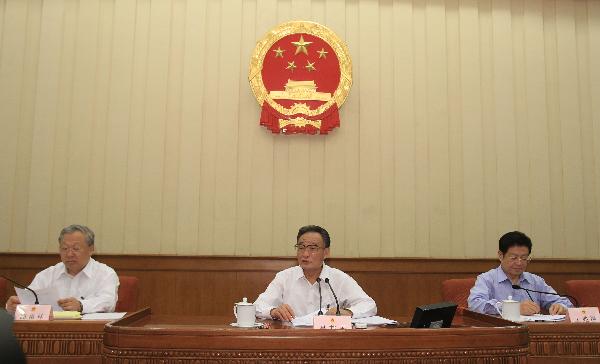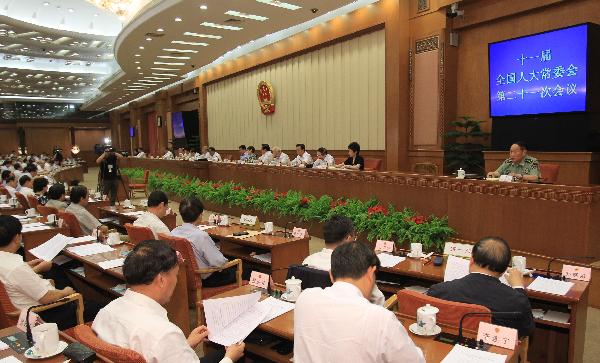
Wu Bangguo (C), chairman of the Standing Committee of the National People's Congress (NPC), speaks during the closing meeting of the 21st session of the Standing Committee of the 11th NPC in Beijing, capital of China, June 30, 2011. (Xinhua/Fan Rujun)
BEIJING, June 30 (Xinhua) -- China's top legislature on Thursday ended its four-day bimonthly session, adopting an amendment to the individual income tax law and a law on administrative mandatory practices.
The amendment raises the monthly tax exemption threshold from 2,000 yuan (307.7 U.S. dollars) to 3,500 yuan (538.5 U.S. dollars), which is 500 yuan greater than the amount originally proposed in a previous draft of the amendment.
The previous law stated that individuals who earn less than 2,000 yuan (307.7 U.S. dollars) per month are not required to pay income taxes. The draft amendment, submitted for its first reading on April 20, proposed raising the threshold to 3,000 yuan per month.
Wu Bangguo, chairman of the Standing Committee of the National People's Congress (NPC), said that the amendment to the individual income tax law relates to ordinary people's basic interests and is a widely-concerned major step for the country to adjust the distribution of income.
According to Wu, the amendment aims to reduce the tax burden for people with low incomes, and the country will make more efforts in pushing forward the reform of its individual income tax system in order to ensure taxation a better role in adjusting income distribution.
The law on administrative mandatory practices was passed after five reviews by legislators.
"The law stipulates specific procedures and limits for implementing administrative mandatory measures, which is of significant importance to regulate the work of administrative organs and ensure the legal rights of citizens, corporations and other organizations," Wu said.
Adopting the law marks the completion of China's legal framework regarding the administrative authority of government agencies.
President Hu Jintao signed presidential decrees to enact the law and the amendment.
At the session, the top legislature also approved a report on last year's fiscal situation, as well as ratified a treaty with Algeria on mutual judicial assistance in civil and commercial affairs.
Also on Thursday, the NPC Standing Committee held a special lecture on strengthening and innovating social management, which was presided over by Wu.
The lecture was given by Li Peilin, director of the sociological research center under the Chinese Academy of Social Sciences.
According to Li, as China's economy and society are undergoing rapid development, the country's social management requires innovative concepts and mechanisms to cope with new situations and challenges.
Li advised to set up a professional social management team while encouraging communities and social organizations to play a more important role in grass-roots social management work.

Delegates attend the closing meeting of the 21st session of the Standing Committee of the 11th National People's Congress (NPC) in Beijing, capital of China, June 30, 2011. Wu Bangguo, chairman of the Standing Committee of the NPC, presided over the meeting. (Xinhua/Fan Rujun)

